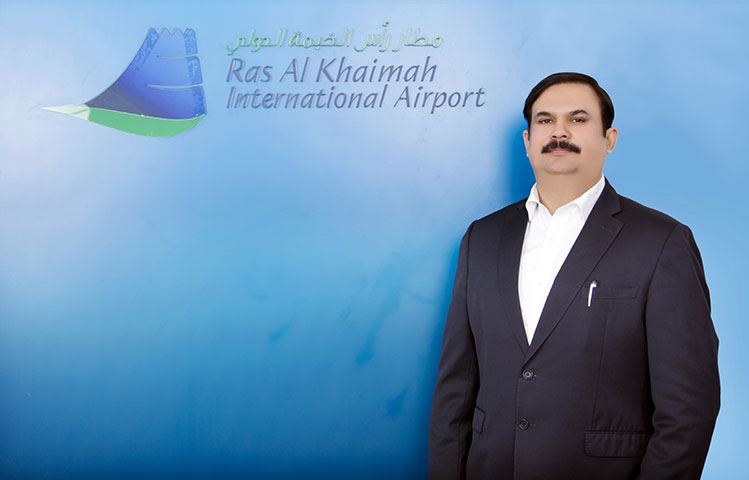Sanjay Khanna, CEO of Ras Al Khaimah International Airport, interviewed by Marta Dimitrova.

Sanjay Khanna, CEO of Ras Al Khaimah International Airport: “Having worked in various environments, with different management styles and complex aviation infrastructure projects, has given me enough exposure to affect the strategy we will put in place. My past experience will help me in working closely with various stakeholders, internal and external customers, government, commercial, airport development and operations, so that informed decisions can be taken.”
Being the fourth-largest emirate and certainly one of the most picturesque, known for its Arabian Gulf beaches, Ras Al Khaimah continues to establish itself as a robust and growing market with a diversified economic base.
Ras Al Khaimah International Airport (RAK) is experiencing positive growth, especially this winter season, given the increased interest and marketing of the airport to European airlines and customers.
“An airport is always the prime gateway and face of a country,” says Sanjay Khanna, CEO Ras Al Khaimah International Airport. “It is a catalyst for the growth of business and tourism. Given our strong foothold in business, led by Ras Al Khaimah Tourism Development Authority (RAKTDA) and Ras Al Khaimah Economic Zone (RAKEZ), we intend to make Ras Al Khaimah International Airport the gateway to RAK’s opportunities and prosperity.”
Khanna was appointed CEO of the airport this September. “Being appointed CEO of Ras Al Khaimah International Airport is a great honour, which brings with it some interesting and exciting challenges,” he enthuses. Listing some of the initial priorities, he emphasised creating, testing and designing the implementation of short and long-term strategies, reviewing and understanding all areas of the business, determining the organisation’s allocation of resources and optimal direction, and building a strong and committed team.
Tourism is a central pillar of Ras Al Khaimah’s economic growth and diversification strategy. GDP has grown consistently over the past few years – up 4% compared to last year. “The statistics show the significant increase in hotel occupancy in Ras Al Khaimah, and the trend also indicates growth,” Khanna explains. “The increase in flights for this winter compared to last demonstrates the same. I believe that through close coordination with RAKTDA and RAKEZ, Ras Al Khaimah’s aviation sector will experience strong growth in the near future.”
In terms of attracting new airlines, Khanna describes RAK as “a sweet spot”. “We are capable of providing the right slots to carriers who value the same. Additionally, our stakeholders assist us by processing passengers at a faster pace than bigger airports, giving us a distinctive edge.”
RAK has been working closely with its hub carrier, Air Arabia, to conclude a short and long-term growth plan. Khanna shares: “We are in discussion with other air carriers, who will complement Air Arabia’s operations, as well as bring point-to-point air traffic to Ras Al Khaimah.”
To respond to its ambitions of being a successful world-class airport, contributing to the long-term growth and prosperity of the airport and regional economy, RAK has invested in technological innovations to enhance the passenger experience. It recently launched a remote check-in facility for passengers, which is also capable of printing baggage tags, therefore reducing queueing time and increasing passenger satisfaction.
Moreover, the airport has introduced e-gate facilities at arrival and departure immigration, which has reduced process time to a minimum and is in line with other airports in the region. The airport also offers free Wi-Fi, allowing travellers to continue their work and social communications. “Very soon we will be opening a pay-and-use business lounge for passengers who would like to enjoy Ras Al Khaimah Airport’s hospitality,” Khanna adds.
Looking ahead, RAK is focused on developing a meaningful partnership with airlines and wishes to grow the market and support business and tourism activities in the coming year. “The growth in the business will enable us the optimum utilisation of our current infrastructure and look into augmenting our capacities and throughput. We are keen to bring in innovative ideas and monetise the available opportunities to generate higher revenues. Last, but not least, we have a goal of making Ras Al Khaimah one of the best benchmarked airports in its category,” Khanna concludes.







